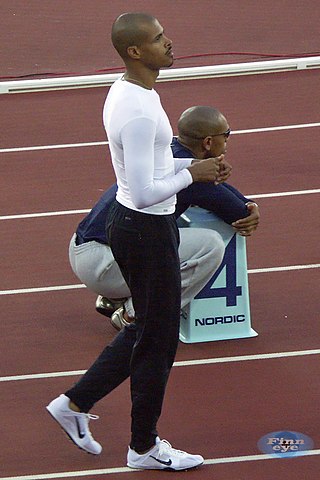
The men's 400 metres hurdles at the 2004 Summer Olympics as part of the athletics program were held at the Athens Olympic Stadium from August 23 to 26. There were 35 competitors from 24 nations. The event was won by Félix Sánchez of the Dominican Republic, the nation's first medal in the men's 400 metres hurdles. Silver went to Danny McFarlane of Jamaica, returning to the podium in the event for the first time since 1992. Naman Keïta's bronze was France's first medal in the event in over 100 years; the last Frenchman to medal in the long hurdles was Henri Tauzin in 1900. The United States' five-Games gold medal streak ended; for only the second time in the history of the event, Americans competed but won no medals.

The men's 400 metres hurdles was the longer of two hurdling events at the 1908 Summer Olympics in London. It was the third time the event had been featured at the Olympics. The Olympic record was beat three times in the course of the Games. The competition was held from Monday, July 20, 1908, to Wednesday, July 22, 1908. 15 runners from six nations competed. NOCs could enter up to 12 athletes. The event was won by Charles Bacon of the United States, defeating teammate and defending champion Harry Hillman by 0.3 seconds in the final. It was the third gold medal in three Games for the American team in the event. Hillman was the first man to earn multiple medals in the 400 metres hurdles. Jimmy Tremeer of Great Britain earned bronze, the first medal for the nation in the men's 400 metres hurdles.

The men's 400 metres hurdles at the 1988 Summer Olympics in Seoul, South Korea had an entry list of 38 competitors, with five qualifying heats and two semifinals (16) before the final (8) took place on Sunday September 25, 1988. One athlete did not start, so there were 37 competitors from 28 nations. The maximum number of athletes per nation had been set at 3 since the 1930 Olympic Congress. The event was won by Andre Phillips of the United States, the nation's second consecutive and 14th overall victory in the event. Amadou Dia Ba earned Senegal's first medal in the event with his silver. Dia Ba broke up a potential American sweep, as 1976 and 1984 champion Edwin Moses took bronze and Kevin Young placed fourth. Moses was the second man to earn three medals in the event.

The men's 200 metres event was part of the track and field athletics programme at the 1920 Summer Olympics. The competition was held on Thursday, August 19, 1920, and on Friday, August 20, 1920. Forty-eight sprinters from 22 nations competed. Nations were limited to 4 athletes each, down from the 12 allowed in previous Games. The event was won by Allen Woodring of the United States, the nation's second consecutive victory in the event and fourth in five Games. Fellow American Charley Paddock took silver. Great Britain reached the podium for a second consecutive Games with Harry Edward's bronze.
The men's 400 metres event was part of the track and field athletics programme at the 1920 Summer Olympics. The competition was held on Thursday, August 19, 1920, and on Friday, August 20, 1920. 37 runners from 16 nations competed. No nation had more than 4 runners, suggesting the limit had been reduced from the 12 maximum in force in 1908 and 1912. The event was won by Bevil Rudd of South Africa, the nation's first title in the event. Nils Engdahl's bronze was Sweden's first medal in the 400 metres.
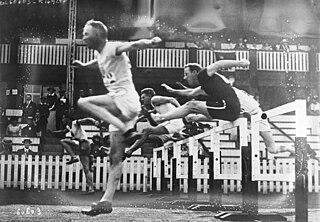
The men's 110 metres hurdles event was part of the track and field athletics programme at the 1920 Summer Olympics. The competition was held on Tuesday, August 17, 1920, and on Wednesday, August 18, 1920. 24 runners from 15 nations competed. No nation had more than 4 runners, suggesting the limit had been reduced from the 12 maximum in force in 1908 and 1912. The event was won by Earl Thomson of Canada in world record time, the first victory by any nation other than the United States in the men's 110 metres hurdles and the first time that any non-U.S. nation had even been on the podium since 1896. Thomson, who had lived in the United States since age 8, had wanted to run for the U.S. team but was ineligible due to his Canadian citizenship. A British flag was displayed at the medal ceremony rather than a Canadian one because the organizing officials did not have the appropriate flag.

The men's 400 metres hurdles event was part of the track and field athletics programme at the 1924 Summer Olympics. The competition was held on Sunday, July 6, 1924, and on Monday, July 7, 1924. Twenty-three hurdlers from 13 nations competed. The maximum number of athletes per nation was 4. The event was won by Morgan Taylor of the United States, the fifth consecutive victory by an American in the event. Erik Wilén received silver, Finland's first medal in the men's 400 metres hurdles. Another American, Ivan Riley, took bronze.

The men's 400 metres hurdles at the 1980 Summer Olympics in Moscow, Soviet Union had a start list of 22 competitors from 19 nations, with three quarterfinals, two semifinals (16), and a final (8) that took place on Saturday July 26, 1980. The maximum number of athletes per nation had been set at 3 since the 1930 Olympic Congress. The event was won by Volker Beck of East Germany, the nation's first medal in the event. Vasyl Arkhypenko earned silver, the second consecutive Games that the Soviet Union reached the podium in the event. Gary Oakes put Great Britain back on the podium after a one-Games absence with his bronze.
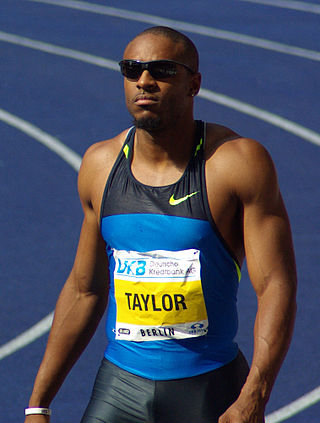
The men's 400 metres hurdles at the 2000 Summer Olympics as part of the athletics programme were held at Stadium Australia on Sunday 24 September, Monday 25 September and Wednesday 27 September 2000. There were 62 competitors from 45 nations. The event was won by 0.03 seconds by Angelo Taylor of the United States, the nation's fifth consecutive and 17th overall victory in the event. Saudi Arabia and South Africa each earned their first medals in the men's 400 metres hurdles, as Hadi Souan Somayli took silver and Llewellyn Herbert received bronze.

The men's 400 metres hurdles event at the 1928 Olympic Games took place between July 29 & July 30. There were 25 athletes from 13 nations. The maximum number of athletes per nation was 4. The event was won by David Burghley of Great Britain, the first time a hurdler not from the United States had won. Americans Frank Cuhel and Morgan Taylor took silver and bronze. Taylor, who had been the defending champion, was the second man to win multiple medals in the 400 metres hurdles.

The men's 400 metres hurdles event at the 1936 Summer Olympic Games took place on August 3 and August 4. There were 32 competitors from 20 nations. The maximum number of athletes per nation had been set at 3 since the 1930 Olympic Congress. The final was won by American Glenn Hardin. After two Games of silver and bronze medals, it was the United States' first victory since 1920 and sixth overall. However, it was the first time since 1900 that the Americans had only one medalist in the event. John Loaring took Canada's first 400 metres hurdles medal since 1900 with his silver. Miguel White gave the Philippines a bronze in its 400 metres hurdles debut.

The men's 400 metres hurdles event at the 1948 Summer Olympic Games took place July 30 and July 31. There were 25 competitors from 17 nations. The maximum number of athletes per nation had been set at 3 since the 1930 Olympic Congress. The final was won by American Roy Cochran. It was the nation's second consecutive and seventh overall victory in the event. Duncan White won Ceylon's first Olympic medal in any event with his silver. As of the 2016 Games, it remains the only medal won by a male competitor from Ceylon/Sri Lanka; the nation has won one other medal, Susanthika Jayasinghe's silver in the 2000 women's 200 metres. Sweden's first medal in the men's 400 metres hurdles was won by Rune Larsson, taking bronze.

The men's 400 metres hurdles event at the 1932 Olympic Games took place on July 31 and August 1 at the Los Angeles Memorial Coliseum. There were 18 competitors from 13 nations. The 1930 Olympic Congress in Berlin had reduced the limit from 4 athletes per NOC to 3 athletes. The event was won by Bob Tisdall of Ireland, the nation's first medal in the event in its 400 metres hurdles debut. The United States took silver and bronze, extending its streak of taking at least silver in all 7 appearances of the event to that point. Taylor became the first man to earn three medals in the event, adding to his 1924 gold and 1928 bronze. Defending champion David Burghley of Great Britain finished fourth.
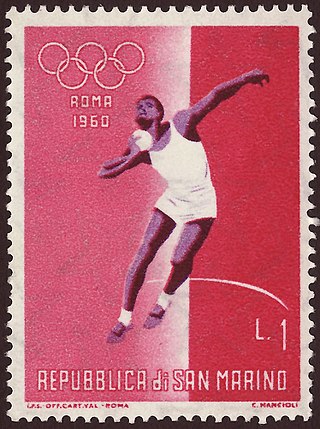
The men's 400 metres hurdles event at the 1960 Olympic Games took place between August 31 and September 2. There were 34 competitors from 23 nations. The maximum number of athletes per nation had been set at 3 since the 1930 Olympic Congress. The event was won by Glenn Davis of the United States, the first man to successfully defend an Olympic title in the 400 metres hurdles. As of the 2016 Games, he remains the only man to do so; three others have won two gold medals in the event, but all three did so in nonconsecutive Games. It was the United States' fifth consecutive and 10th overall victory in the event. The Americans also completed their second consecutive medal sweep in the event, as Cliff Cushman took silver and Dick Howard took bronze.

The men's 400 metres hurdles event at the 1952 Summer Olympics took place July 20–21, 1952 at the Helsinki Olympic Stadium. There were 40 competitors from 24 nations. The maximum number of athletes per nation had been set at 3 since the 1930 Olympic Congress. The final was won by American Charles Moore. It was the nation's third consecutive and eighth overall victory in the event. The Soviet Union, in its debut, and New Zealand each earned their first medal in the men's 400 metres hurdles, with Yuriy Lituyev's silver and John Holland's bronze, respectively.

The men's 400 metres hurdles was an event at the 1976 Summer Olympics in Montreal. The competition was held from July 23, 1976, to July 25, 1976. There were 22 competitors from 16 nations. The maximum number of athletes per nation had been set at 3 since the 1930 Olympic Congress. American Edwin Moses won the final in a world record and Olympic record time of 47.64 seconds, winning by 1.05 seconds. His time was initially noted as one hundredth slower, but this was rounded up after an analysis of the photo finish. It was the United States' first victory in the event since 1964 and 12th overall. Fellow American Michael Shine took silver. Yevgeniy Gavrilenko earned the Soviet Union's first medal in the event since 1952 with his bronze. Great Britain's three-Games podium streak in the event ended.

The men's 400 metres hurdles at the 1984 Summer Olympics in Los Angeles, California had an entry list of 45 competitors from 30 nations, with six qualifying heats and two semifinals (16) before the final (8) took place on Sunday August 5, 1984. The maximum number of athletes per nation had been set at 3 since the 1930 Olympic Congress. American Edwin Moses won his second Olympic gold medal after 1976, while his 18-year-old teammate Danny Harris took the silver medal. Moses' gold was the United States' 13th victory in the event. He became the sixth man to win multiple medals in the event, and the second to win multiple golds. Harald Schmid of West Germany took bronze, giving the nation its first medal in the 400 metres hurdles since 1968.
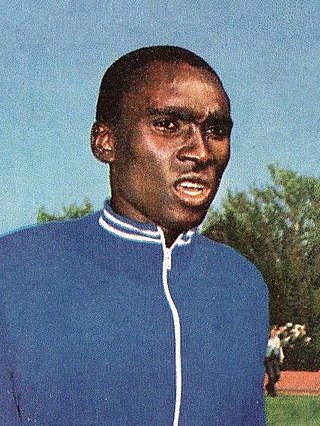
The men's 400 metres hurdles was an event at the 1972 Summer Olympics in Munich. The competition was held on 31 August - 2 September. There were 37 competitors from 25 nations. The maximum number of athletes per nation had been set at 3 since the 1930 Olympic Congress. The event was won by John Akii-Bua of Uganda, the nation's first medal in the event and first gold medal in any Olympic event. Ralph Mann returned the United States to the podium after a one-Games absence with his silver medal, while David Hemery added a bronze to his 1968 gold to become the fifth man to earn multiple medals in the event while extending Great Britain's podium streak in the 400 metres hurdles to three Games.
The men's 400 metres hurdles competition at the 1956 Summer Olympics in Melbourne, Australia took place on November 23–24 at the Melbourne Cricket Ground. There were 28 competitors from 18 nations. The maximum number of athletes per nation had been set at 3 since the 1930 Olympic Congress. The event was won by Glenn Davis of the United States, the nation's fourth consecutive and ninth overall victory in the men's 400 metres hurdles. Eddie Southern (silver) and Josh Culbreath (bronze) completed the American sweep, the third time that the United States had swept the medals in the event.
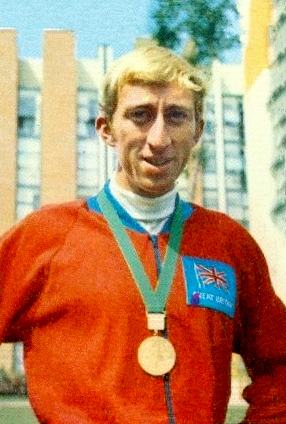
The men's 400 metres hurdles competition at the 1968 Summer Olympics in Mexico City, Mexico took place on October 13–15 at the Estadio Olímpico Universitario. There were 30 competitors from 24 nations. The maximum number of athletes per nation had been set at 3 since the 1930 Olympic Congress. The event was won by David Hemery of Great Britain, the nation's first victory in the men's 400 metres hurdles since 1928 and second overall—second-most after the United States' 11. The win broke a streak of 6 consecutive American victories. Further, the United States failed to medal in the event for the first time ever; in all 13 previous times the event was held, the American team had at least a silver medalist. Great Britain was the first nation other than the United States to have two medalists in the event in the same Games, as John Sherwood took bronze. Gerhard Hennige of West Germany was the first German hurdler to earn a medal in the event, finishing between the two Britons with silver.
















